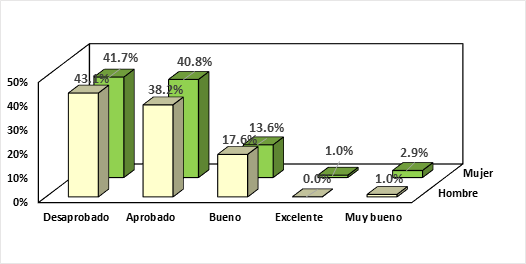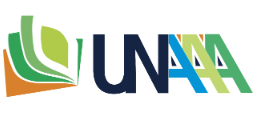Diagnostic evaluation of linguistic competence in university students in the face-to-face system in a post-COVID 19 context
DOI:
https://doi.org/10.56926/unaaaciencia.v1i1.5Keywords:
text reading, oral language, text productionAbstract
The objective was to identify the level of achievement of linguistic competence in university students who have returned to attendance in a post-COVID 19 context. The research was basic level and descriptive design. The sample was census, 206 entrants to the five study programs of the Universidad Nacional Autónoma de Alto Amazonas participated. As a data collection instrument for written language and text reading, a dichotomous pedagogical test was used; to diagnose oral language, a Likert scale was used. The results showed that 0.5% of students are in the excellent level, 1.9% very good level and 15.5% good. 39.8% approved with a grade of 10.5 and 42.2% disapproved. Performed the Student's T test = -16.013 with 206 gl and with a p = 0.000, it was concluded that the linguistic competence in university students is good. The university grading system that governs Peru was taken as a reference and is vigesimal, from 0 to 20, with the minimum passing grade being 10.5 equivalent to 11, in which the grade from 14 to 16 are categorized as good.
Downloads
References
Abdrasheva, D., Escribens, M., Sabzalieva, E., Vieira do Nascimento, D., & Yerovi, C. (2022). Resuming or reforming? Tracking the global impact of the COVID-19 pandemic on higher education after two years of disruption. Instituto Internacional de la UNESCO para la Educación Superior en América Latina y el Caribe. https://unesdoc.unesco.org/ark:/48223/pf0000381749
Bevins, F., Bryant, J., Krishnan, C., & Law, J. (2020). Coronavirus: How should US higher education plan for an uncertain future? McKinsey & Company. https://www.mckinsey.com/industries/education/our-insights/coronavirus-how-should-us-higher-education-plan-for-an-uncertain-future
Chaparro Serrano, M. F. (2022). Competencia comunicativa, oral y escrita, en estudiantes de ciencias de la salud de una universidad de Bogotá D. C., Colombia. Educar, 58(2), 501-516. https://doi.org/10.5565/rev/educar.1502
Fuchs, K. (2022). The difference between emergency remote teaching and e-learning. Frontiers in Education, 7. https://doi.org/10.3389/feduc.2022.921332
Gil-Galván, R., & Martín-Espinosa, I. (2021). ¿Cómo valoran los estudiantes universitarios de Educación su dominio de competencias lingüísticas en lengua extranjera? Revista Complutense de Educación, 32(2), 237-247. https://doi.org/10.5209/rced.68326
González Fernández, M. O., & Huerta Gaytán, P. (2019). Experiencia del aula invertida para promover estudiantes prosumidores del nivel superior. RIED. Revista Iberoamericana de Educación a Distancia, 22(2), 245. https://doi.org/10.5944/ried.22.2.23065
IESALC UNESCO. (2020). COVID-19 y educación superior: De los efectos inmediatos al día después. Revista Latinoamericana de Educación Comparada, 11(17). https://www.saece.com.ar/relec/revistas/17/doc1.pdf
Kara, M. (2020). Distance education: a systems view of online learning. Educational Review, 72(6), 800-800. https://doi.org/10.1080/00131911.2020.1766204
Korniyaka, O. (2018). Features of University Teachers’ Communicative-Speaking Competence. Psycholinguis, 24(1), 183-206. https://doi.org/10.31470/2309-1797-2018-24-1-183-206
Leal Rivas, N. (2020). Competencia Comunicativa Intercultural Crítica y escritura académica: análisis de los (sub)procesos de creación textual en estudiantes universitarios de Español Lengua Extranjera (E/LE). Porta Linguarum, 34. http://hdl.handle.net/10481/63864
Manturuk, K., & Reavis, G. (2022). Pedagogical implications of Covid-19: a case study of what faculty learned about teaching well by teaching remotely during the Covid-19 pandemic. En STAR Scholars (Ed.), Global higher education during COVID-19: Policy, society, and technology. https://ojed.org/index.php/gsm/article/view/3263
Neira-Piñeiro, M. del R., Sierra-Arizmendiarrieta, B., & Pérez-Ferra, M. (2017). La competencia comunicativa en el grado de maestro de infantil y primaria. Una propuesta de criterios de desempeño como instrumento para su análisis y evaluación. Revista Complutense de Educación, 29(3), 881-898. https://doi.org/10.5209/RCED.54145
Pascual Lacal, M. R., Madrid Vivar, D., & Álvarez, N. S. (2022). La formación inicial docente en la competencia lingüística: estudio comparativo entre los grados de Educación Infantil y Educación Primaria. Revista Interuniversitaria de Formación del Profesorado. Continuación de la antigua Revista de Escuelas Normales, 98(36). https://doi.org/10.47553/rifop.v98i36.2.93768
Purvis, C. J., McNeill, B. C., & Everatt, J. (2016). Enhancing the metalinguistic abilities of pre-service teachers via coursework targeting language structure knowledge. Annals of Dyslexia, 66(1), 55-70. https://doi.org/10.1007/s11881-015-0108-9
Ramos, G., Chiva, I., & Gómez, M. B. (2017). Las competencias básicas en la nueva generación de estudiantes universitarios: Una experiencia de Innovación. REDU. Revista de Docencia Universitaria, 15(1), 37. https://doi.org/10.4995/redu.2017.5909
Sordo Molina, J. (2017). Adquisición escolar del español y minusvaloración de las propias competencias lingüísticas en estudiantes indígenas emigrados a Nuevo León. Revista mexicana de investigación educativa, 22(75). https://www.comie.org.mx/revista/v2018/rmie/index.php/nrmie/article/view/54
Toropova, N. V., Sharafeeva, A. F., & Semenovna, V. H. (2016). Development of the students cross-language communication competence in the federal university educational space based on the regional cultural approach. The Turkish Online Journal of Design, Art and Communication, 6. http://www.tojdac.org/tojdac/VOLUME6-NOVSPCL_files/tojdac_v060NVSE133.pdf
Tucker, L., & Quintero-Ares, A. (2022). Professional learning communities as a faculty support during the COVID-19 transition to online learning. Online Journal of Distance Learning Administration, 24(1). https://ojdla.com/articles/professional-learning-communities-as-a-faculty-support-during-the-covid-19-transition-to-online-learning
UDUAL. (2022). Conferencia Mundial de Educación Superior 2022. Reformular los ideales y prácticas de la Educación Superior para asegurar el desarrollo sostenible del planeta y de la humanidad. UNESCO. https://www.udual.org/principal/wp-content/uploads/2022/02/UDUAL-Barcelona-febrero-final.pdf

Published
How to Cite
Issue
Section
License
Copyright (c) 2022 Angélica Sánchez-Castro, Herbert-Víctor Huaranga-Rivera, Gilbert Iván Chua-Chua

This work is licensed under a Creative Commons Attribution 4.0 International License.
The authors retain their rights:
a. The authors retain their trademark and patent rights, as well as any process or procedure described in the article.
b. The authors retain the right to share, copy, distribute, execute and publicly communicate the article published in the scientific journal UNAAACIENCIA-PERÚ (for example, place it in an institutional repository or publish it in a book), with an acknowledgment of its initial publication in UNAAACIENCIA-PERU.
c. Authors retain the right to make a subsequent publication of their work, to use the article or any part of it (for example: a compilation of their works, notes for conferences, thesis, or for a book), provided that they indicate the source. of publication (authors of the work, magazine, volume, number and date).







